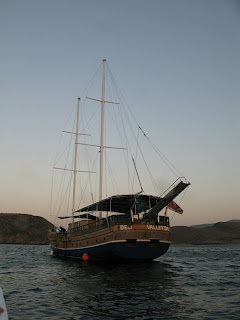Expedition leader Gareth Jeffreys posts the last blog from the 2012 Djibouti expedition and as always, its sad to have to wrap things up... but there's always next year!
The third and final week of the Djibouti whale shark expedition has come to an end, and we unfortunately have had to say goodbye to our north African whale sharks, as well as the skippers and crew of the Deli Valetta, for another year.

The team for week three aboard the Deli
This week we had a full boat to see off our trip, with both new and familiar faces joining us on board. David Robinson returned for his second year (and he certainly hopes it won’t be his last) while some of the new faces to the Deli were in fact well known friends of the MCSS. Peter Verhoog of the Save Our Seas Foundation, came to see what we were up to as the Foundation were part sponsoring the expedition again this year; also aboard was Dr. Jennifer Schmidt of the University of Illinois, who assists the programme with genetic analysis. They were joined David Dixon, a very experienced British diver, Benoit Pardigon, an attorney from Paris and Gabrielle Methou for the last thrilling encounters of 2012.

A night encounter under the flood lights of Deli
Also with us for a few days were Yannick Aubry, of the Sheraton, Djibouti and cinematographer Rene Heuzey, both keen to be involved with the project to help with the protection of the species here in the Djibouti.
The week didn’t disappoint either, and the whale sharks certainly put a smile on everyone’s faces with encounters taking place both day and night throughout the final phase.

MCSS Expedition leader Gareth Jeffreys surfaces during a night encounter
And so it was certainly a sad moment when the Deli left her mooring on Friday morning to embark back for port.
This did not however detract from some much needed relaxation time, and the annual excursion to Lac Assal (the lowest point in Africa and second lowest in the world I have been reliably informed) performed miracles to some aching joints with a 15 minute floating session in, or more aptly, on top of the salt rich waters. Which was a wonderful idea at the time, but not quite so wonderful come the trip home for those without a spare pair of shorts (Ben)!

A little salty relaxation for the team at Lac Assal
Usually this would have marked the end of our time in Djibouti before working through all the data over the coming weeks back in the Seychelles, but this year Michel Vely and Daniel Jouannet of Megaptera, together with Rene Heuzey and Bertrand LaFrance of DECAN, the Djibouti Cheetah Refuge, had arranged for a whale shark conference to be given to the people of Djibouti the Saturday of our return. And so it was that we were able to present to all those that attended our findings from the nine years of study so far and inform them of the remarkable gift they possess and what actions will be needed if they are to preserve it.

Michel Vely and Gareth presenting the research findings
Judging by the number of people in the audience and the interest shown from all, we came away positive and confident for the future of whale shark protection in the Gulf of Tadjoura.
It therefore just leaves me to say a massive thank you to all those who joined us over the three weeks, to Yannick for his extra support, to the hard working and ever helpful crew of the Deli, to the Megaptera team, to the Save Our Seas Foundation, and last but certainly not least, to the sleep deprived but very satisfied members of the MCSS.
Gareth Jeffreys, expedition leader










